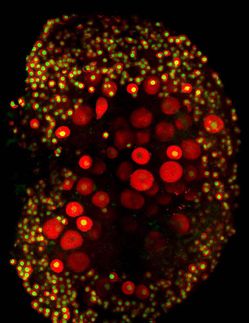Study describes drug that could prevent infertility in cancer patients
Advertisement
A new study led by Brian Hermann, assistant professor of biology at The University of Texas at San Antonio (UTSA), shows promising evidence that a medication previously used to prevent infections in cancer patients can also keep them from becoming infertile. Losing fertility is a frequent problem among cancer patients, as treatments for the disease often halt sperm production.
Hermann and his research team have been pursuing a number of cutting-edge research initiatives to restore fertility in men who have lost their ability to have children as a result of cancer treatments they received as children. While working on methods to restart sperm production, the researchers discovered a link between a drug for recovering cancer patients and the absence of normal damage to reproductive ability.
The drug is called G-CSF or granulocyte colony-stimulating factor. It stimulates the bone marrow to produce neutrophils, which are white blood cells that are needed to fight infections. They're commonly lost after chemotherapy and radiation treatments.
"We were using G-CSF to prevent infections in our research experiments," Hermann said. "It turned out that the drug also had the unexpected impact of guarding against male infertility."
Because cancer treatments like radiation and chemotherapy often kill sperm stem cells, male reproduction can become essentially impossible. In Hermann's laboratory, G-CSF, by promoting cell growth, unexpectedly began regenerating sperm production by creating new sperm cells to replace the dead cells.
A study authored by Hermann and his students is describing these results. Hermann's laboratory focuses almost exclusively on regenerating dead testicular tissue through the use of stem cells, making the project an exciting but unexpected detour that he hopes to continue, if possible.
The next step would be observing whether the use of the drug, which is already prescribed often by oncologists, has any correlation with improved fertility among cancer patients. Until then, Hermann is focusing on better understanding the stem cells that make male reproduction possible, so he can find even more effective solutions to treating male infertility.
"Male infertility is an intuitive disease and we need creative solutions," he said. "But we need to understand how things work before we can fix them."
Original publication
Travis Kotzur, Roberto Benavides-Garcia, Jennifer Mecklenburg, Jamila R. Sanchez, Matthew Reilly and Brian P. Hermann; "Granulocyte colony-stimulating factor (G-CSF) promotes spermatogenic regeneration from surviving spermatogonia after high-dose alkylating chemotherapy"; Reproductive Biology and Endocrinology; 2017



























































